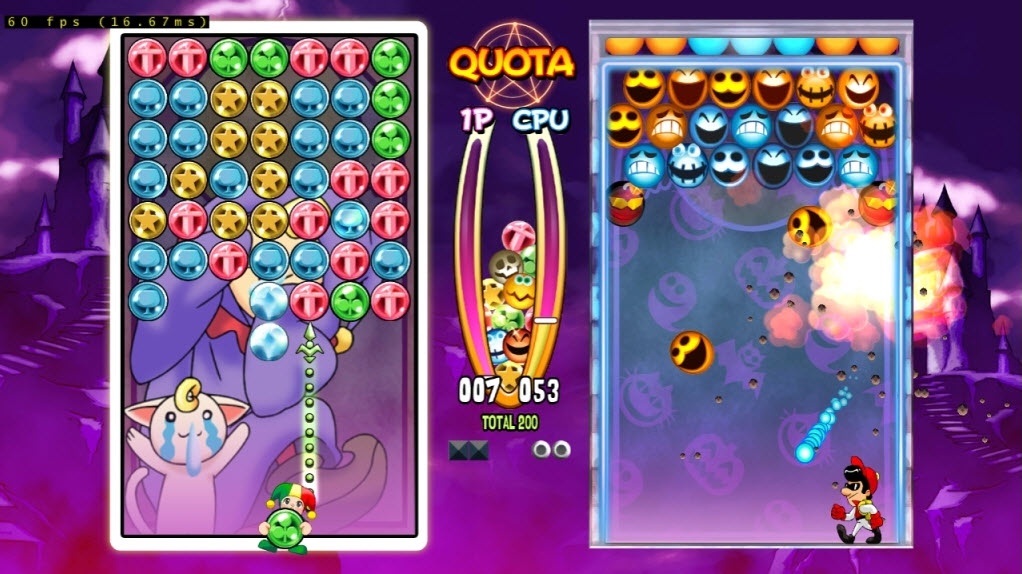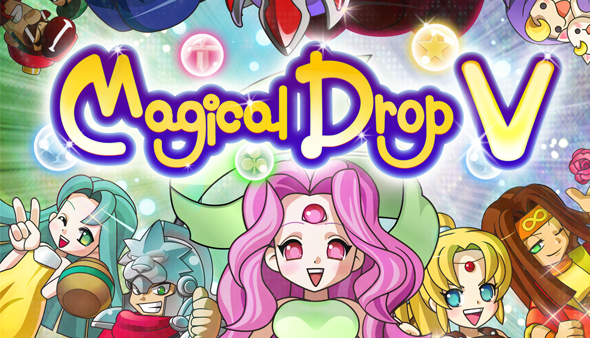I am deeply saddened by the dire straits of puzzle games. Although the genre itself remains almost as old as video games themselves, how often have you seen a pure puzzle game released in this day and age? Usually, we relegate the concept to a simple door switch or box pushing puzzle of yore, but games like Tetris still have the ability to show us something amazing and marvelous. There’s a purity and fun behind simple pattern recognition with a cutesy aesthetic that I can accept any day of the week. People who played Panel de Pon/Tetris Attack/Pokemon Puzzle League, or Dr. Mario, or any of these sorts of games knows the joy of this. Best of all, there’s really no upper limit to the skill you can obtain; one can always make improvements to their game due to the element of randomness. Or, you might say, they encourage replayability that became utterly foreign the moment narrative driven games took front and center in the marketplace.
So, to wit: when I saw Magical Drop V, for example, pop up on Steam, I was amazed and baffled at the same time. The last English release of this series came on the Neo Geo in Magical Drop III – that was fifteen years ago. Heck, the company that made the games, Data East, went bankrupt TEN YEARS ago. I never even had the chance to play the games, given that they’re exclusive to a platform that you needed to play in arcade or dump huge amounts of money to play at home. Furthermore, every port comes from Japan (yes, I have a Japanese PS2, but I’m not paying 30-40 dollars) remain expensive, and the recent Data East collection for the Wii went out of print before you could blink.
Thank you, Ignition Entertainment and Golgoth Studios!
Apparently, the game released in an entirely horrible, buggy, and nearly unplayable state, but now the game works rather brilliantly AND has local and online competitive play with up to four people. Tell me if that doesn’t sound awesome. Or not, if you’ve never played of these games before.
What’s so cool about Magical Drop (other than sound like some kind of illicit substance)? To wit, it’s the first competitive puzzle game. Think about it: arcade goers aren’t likely to plunk their quarters/tokens into a versus game with no balance. You can’t just wander into the game and expect to win; there’s an endless mode, sure, but the only real way to play Magical Drop comes from friends in competition (or now, complete strangers who always play the game more than you!).
So, to make this screenshot make more sense:

Let me describe. Your character moves from left to right on the bottom of the screen. The goal, at its most basic, consists of chaining three orbs of the same color together – doing this piles additional orbs onto your opponents screen, giving them less breathing room and less time to think. Depending on what character you choose, different patterns appear on the other side of the screen.
One button take an orb, another releases it into a row. You can gather as many orbs of the same color as you like, but you cannot gather another color until you release the ones you already picked up. The orbs scroll from the top down; if they get too close to your player character, you lose. If your quota of orbs (marked in the middle) remains higher than your opponent, you also lose. In both cases, it’s a race against variable time based on your opponent’s skill. You need to think quick and fast.
Of course, advanced play doesn’t merely come from chaining three as fast as possible (although yes, doing several of those in a row nets you a multiplier). Setting chains of orbs in advance will net you a higher score as that breaks up the orbs in the fastest way possible. Thus, recognizing patterns, finding out which orbs to save and how to position orbs for better combos and chains means pattern recognition. And, let’s say, there’s not a lot of games nowadays that really encourage this same sort of stress, fury, and execution all at the same time. That doesn’t even begin to mention the Ghostlop characters. Taking their style from an obscure (and unreleased) Neo Geo title, they don’t take the orbs so much as bounce them off the walls. Chaining works the same, but the orb bounces off orbs of different colors, thus meaning accuracy under pressure. Some say they destroy the game balance; to me, they simply add variety, although their mechanic can certainly change the tide rapidly. You can literally “lop” off a whole section of orbs by taking out the ones above it. Thank God for patches, huh (otherwise, somebody somewhere’s tearing their hair out trying to beat the Ghostlop variant).
Honestly, I’m trying to think of another pure puzzle game like this that came out last year, and I’m coming up blank. If you can point one out that sold well and ACTUALLY was mentioned by the mainstream press (Magical Drop V most certainly received no coverage at all), please point this out to me. Puzzle games became a dying breed, and I don’t know why. Well, I suppose we could call Angry Birds and its smart phone ilk “puzzle games”, but they’re not like the ones of old. They’re basically brain-teasers at a basic level, and not so much a full-fledged game with scoring that matters.
This has much to do with the way we perceive social mores in the modern day as well. Haven’t you noticed the lack of love for games in abstraction? Games that don’t bother to attach a narrative or some kind of social/moral statement into the game? Out of all the indie games I have played, the two I enjoyed the most received little to no recognition at all from any internet resource I ever read: Noitu Love 2 and Offspring Fling. These games didn’t try anything new; instead, they refined a style that already existed and did an absolutely brilliant job. Noitu Love 2’s brand of Gunstar Heroes plus crazy shmup with mouse and keyboard controls works incredibly well and offers a great challenge. Offspring Fling revives that age old puzzle platformer – games like Donkey Kong for the Game Boy seem like obvious influences, although the game strikes a unique brain challenge all its own. Yet, I think you’d be hard pressed to find anyone who even knows it exists, especially Noitu Love 2, a five (!) year old game I just recently played.
That, I imagine, isn’t too far from the fate of the puzzle genre – it doesn’t attach a story of any import or seriousness. It cannot create a purposed narrative – how, exactly, could you attach it? I guess Catherine counts as the closest example, but it’s a single-player experience with set challenges, not a game one can return to again and again. Once memorized, you’re done and done with the whole shebang.

Or, you might say, we’ve overcomplicated life. We’ve assumed that, like our video games, life need not but fun and simple, but complex and depressing. We always accept the maxim that “life doesn’t have easy answers”…why? Because authorities and everyone else around us tells us that this, in fact, represents the state of affairs. We were sure that we had the answers, but then we doubt and we “fall off the wagon”, so to speak. Instead of fighting for what we believe, we merely give into pressure and admit “well, I guess I’d better be a little more tolerant and understanding”.
Not that this is a bad thing! When this impulse (developed or no) becomes an impediment to truth, then we never give a definite answer to anything for fear of offense or our own lack of understanding. Life becomes too complicated to give a definitive answer to anything. Yet Christianity, at its core, remains all about truth. When you read John 8:31-2, there’s a beautiful simplicity to it:
31 So Jesus was saying to those Jews who had believed Him, “If you continue in My word, then you are truly disciples of Mine; 32 and you will know the truth, and the truth will make you free.”
We find, furthermore, that doubt in our convictions leads to ineffectiveness and inaction; a complicated world means a constant desire to vacillate. James 1 tells us:
5 But if any of you lacks wisdom, let him ask of God, who gives to all generously and without reproach, and it will be given to him. 6 But he must ask in faith without any doubting, for the one who doubts is like the surf of the sea, driven and tossed by the wind. 7 For that man ought not to expect that he will receive anything from the Lord, 8 being a double-minded man, unstable in all his ways.
A person of double mind cannot help but play his part and submit to the role of experts – our culture – who tell us what to think. And what they tell us to think, unlike the Christian faith, is “my answer could never be complete, could never be something so simple that God so loved the world, that He gave His only begotten Son, that whoever believes in Him shall not perish, but have eternal life. It couldn’t be that because of scientific negation. Or because multiple religions exist, and by their very existence cast our own into doubt. We find ourselves in a circle, and find ourselves closed and shut out to the wonders of everything outside that circle (hence, why I find the focus on one doctrine of Christianity to put one in a prison). The madman doubts and thinks and rationalizes his thoughts. He remains closed inward; the world, too complicated for his comprehension, becomes perfectly rational and logical: nothing can be true, then.
But yet, in our hearts we can’t think that way. What person, encountering Christ, can find themselves in the circle of complications? As G.K. Chesterton says in his book Orthodoxy:
As we have taken the circle as the symbol of reason and madness, we may very well take the cross as the symbol at once of mystery and of health. Buddhism is centripetal, but Christianity is centrifugal: it breaks out. For the circle is perfect and infinite in its nature; but it is fixed for ever in its size; it can never be larger or smaller. But the cross, though it has at its heart a collision and a contradiction, can extend its four arms for ever without altering its shape. Because it has a paradox in its centre it can grow without changing. The circle returns upon itself and is bound. The cross opens its arms to the four winds; it is a signpost for free travellers.
And that is the thing we must do. Life’s not a puzzle, but an adventure; life’s not a string of ever-increasing complications, but a simple term and a simple message. It is the complications we create and manufacture that place us into a position of doubt. In that sense do we find the paradox of simplicity and freedom skipping hand and hand down the road of humanity’s journey. That was how it was in Christendom for thousands of years; why should it be any different now?
So, what say you? Please post some comments and tell me why I should think otherwise?

